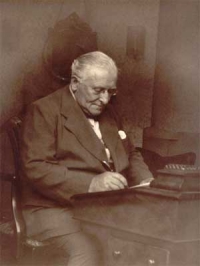Ketelbey
 Albert William Ketèlbey (9 August, 1875 – 26 November, 1959) was an English composer, conductor and pianist.
Albert William Ketèlbey (9 August, 1875 – 26 November, 1959) was an English composer, conductor and pianist.Ketèlbey was born in Alma Street in the Lozells area of Birmingham, England, the son of George Ketelbey (written with no accent), and Sarah Aston. At the age of eleven he wrote a piano sonata that won praise from Edward Elgar. Ketèlbey attended the Trinity College of Music in London, where he showed his talent for playing various orchestral instruments reflected in the masterfully colourful orchestration, especially of oriental inspiration, that became his trademark. At Trinity he beat Gustav Holst in competition for a musical scholarship. He used the pseudonyms Raoul Clifford and Anton Vodorinski for some of his earlier works (some reference books mistakenly give Vodorinski as his true name and Ketèlbey as the pseudonym). His name is frequently misspelt Ketelby.
Being appointed musical director of London's Vaudeville Theatre, Ketèlbey continued writing diverse vocal and instrumental music. Later, he became famous for composing lightweight, popular music, much of which was used as accompaniments to silent films, and as mood music at tea dances. Success enabled him to relinquish his London appointments.
 Ketelbey Latest Sheets Feed
Ketelbey Latest Sheets Feed Ketelbey Latest Requests Feed
Ketelbey Latest Requests Feed
Advertisement
Advertisement


No request found!